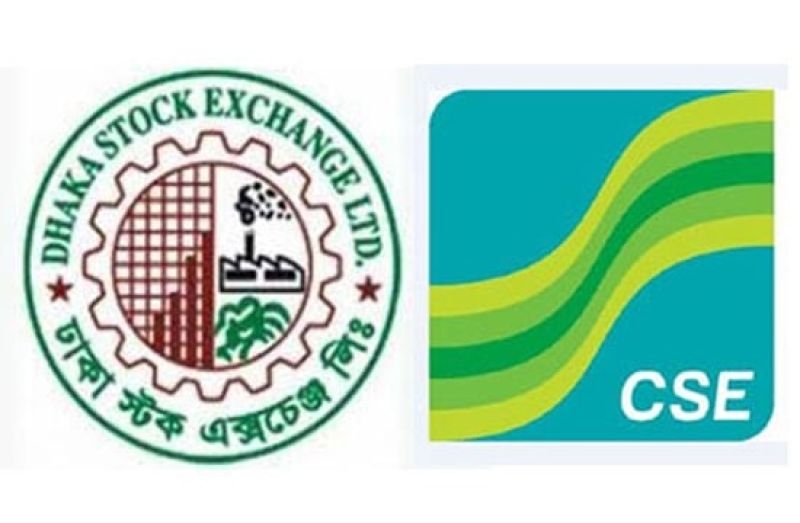- Puppet show enchants Children as Boi Mela comes alive on day 2 |
- DSCC Admin Salam’s drive to make South Dhaka a ‘clean city’ |
- 274 Taliban Dead, 55 Pakistan Troops Killed |
- Now 'open war' with Afghanistan after latest strikes |
- Dhaka's air quality fourth worst in world on Friday morning |
Stock Market falls 150 points; Is Indo-Pak tension to blame

DSE, CSE Logos
Dhaka, May 7 - The country’s stock market has suffered a major blow, with the Dhaka Stock Exchange (DSE) index dropping by a staggering 150 points in a single day.
Market insiders have largely attributed the fall to rising tensions between Pakistan and India, while others believe that rumours were deliberately spread to destabilise the market.
On Wednesday ( May 7), within the first two hours of trading, the DSE’s benchmark index dropped by 120 points.
The downward trend continued throughout the day, with the session ending at a 149-point loss.
Abu Ahmed, Chairman of the Investment Corporation of Bangladesh (ICB), a major financier of the capital market, said, “The impact of Indo-Pak tension is clearly visible in the market. This sharp fall is a result of that. If a formal war breaks out between the two countries, it will certainly affect Bangladesh’s market as well.”
Citing the Russia-Ukraine conflict, he added, “During that war, Bangladesh’s stock market took a big hit. The floor price system was introduced at that time to stabilise the market. If our neighbouring countries go to war, the market will again face severe volatility.”
An analysis of the Dhaka market shows that trading started with the index at 4,951 points and ended at 4,802 points—a loss of 3 percent in a single day.
Not only the benchmark index but also the Shariah-based DSES index dropped by 41 points, and the blue-chip DS30 index fell by 40 points. Out of 399 companies that traded, the share prices of 385 declined, only 9 rose, and 5 remained unchanged.
Across all categories—A, B and Z—most shares lost value.
Notably, among 219 A-category companies, which are generally dividend-paying firms, share prices fell for 215.
A similar picture was seen in the Chittagong Stock Exchange (CSE), where the overall index dropped by 270 points.
Among 270 traded companies, share prices fell for 187 and remained unchanged for 10.
However, the DSE is not entirely convinced that Indo-Pak tension is the sole reason behind the market plunge.
DSE Director Minhaz Mannan Emon commented, “If the market crash were solely due to Indo-Pak tensions, the situation should have been worse in the Indian and Pakistani markets. But that has not happened. So, while it may be a contributing factor, it’s not the primary cause.”
India’s stock market data show that the Sensex index fell by nearly 800 points and the Nifty by 150 points but quickly recovered most of the losses within minutes of opening.
Sector-wise, stocks in media, consumer goods and pharmaceuticals declined, whereas the auto and banking sectors performed relatively well, helping to stabilise the market.
In contrast, Bangladesh’s market failed to recover. Asked why Bangladesh’s market could not withstand the pressure, Saiful Islam, President of the DSE Brokers Association of Bangladesh (DBA), said, “The Indo-Pak tension is being used to create artificial panic. The market was already fragile, and this panic only accelerated the downturn.”
A managing director of a leading brokerage house, speaking on condition of anonymity, said, “The commission is being run by incompetent people. Until that changes, the market will not improve. Investors have lost all confidence. The Indo-Pak issue is merely a trigger—the real problem lies in the market’s structure and weak administration.”
Despite the falling index, trading volume on the DSE crossed Tk 500 crore. According to brokerage house officials, panic was evident from the start of the session, leading to a widespread sell-off and resulting in the market’s poor state. - UNB

